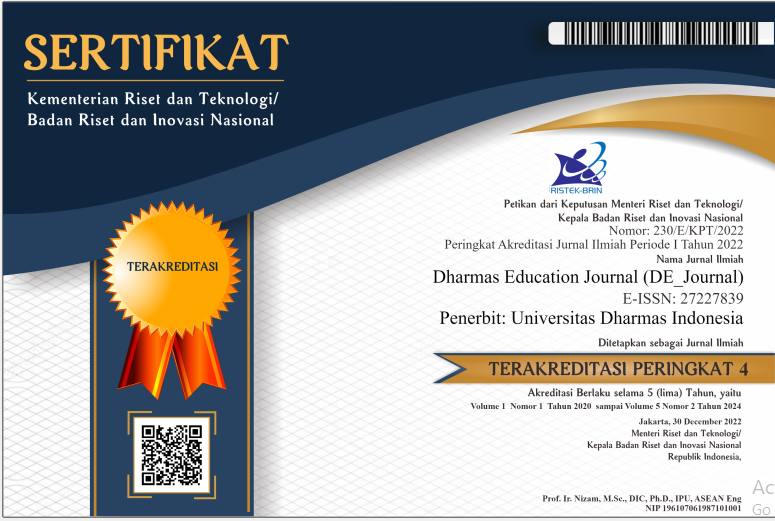ISLAMIC RELIGIOUS EDUCATION LEARNING MANAGEMENT AT THE COLLEGE OF ISLAMIC RELIGIOUS INSTITUTE NURUL HAKIM KEDIRI WEST LOMBOK
DOI:
https://doi.org/10.56667/dejournal.v5i1.1323Keywords:
Learning Management, PAI, Islamic Higher EducationAbstract
Study This aims to analyze PAI learning at the Nurul Hakim Islamic Institute, Kediri, West Lombok. Using a type of field research with a descriptive approach qualitative. Data collection techniques are carried out through three techniques, namely; interviews, observations, and documentation. The research data analysis method used is an interactive model. The results of this research show that there are 4 general stages in PAI learning at the Nurul Hakim Islamic Institute. The 4 stages, namely; planning, implementation, evaluation and supervision. Regarding planning, the Nurul Hakim Islamic Institute is in the process of planning PAI learning in the National Education System, and bases itself on the vision and mission of its Higher Education. Regarding the implementation of this program, it relies on predetermined lecture times, and there are also other activities that are temporary. However, these activities did not have a significant impact on student assessments. So it can be said that the implementation of PAI learning at the Nurul Hakim Islamic Institute (IAI) is not running optimally; and related to evaluation and supervision, it was found that the evaluation and supervision carried out did not fully run optimally, as this also happened in the implementation of PAI learning at the Nurul Hakim Islamic Institute (IAI) itself.
Downloads
References
An-Nahidl, N. A. (2010). Pendidikan Agama di Indonesia: Gagasan dan Realitas. Puslitbang Pendidikan Agama dan Keagamaan.
Athoilah, A. (2013). Dasar-Dasar Manajemen. Pustaka Setia.
Haidar Putra Daulay. (2009). Pemberdayaan Pendidikan Islam di Indonesia. Rineka Cipta.
Jasa Unggah Muliawan. (2005). Pendidikan Islam Integratif. Pustaka Pelajar.
Jusuf Amir Feisal. (1995). Reorientasi Pendidikan Islam. Gema Insani Press.
Limbong, M. (2022). Analysis of Obstacles and Difficulties in the Process of Implementing Learning for Students Based on the Learning Management System (LMS). International Journal of Educational Management and Innovation, 4(2).
Mardeli & Sukirman. (2022). The Relationship Between Learning Attitude, Interest In Learning, Motivation To Learn, And Self-Efficacy With Learning Achievement Of Pai Study Programme Students In The Faculty Of Tarbiyah And Teacher Science UIN Raden Fatah Palembang. Tadrib: Jurnal Pendidikan Agama Islam, 8(2).
Muhaimin dkk. (2008). Paradigma Pendidikan Islam Upaya Mengefektifkan Pendidikan Agama Islam di Sekolah. Remaja Rosdakarya.
Mukhtar. (2003). Desain Pembelajaran Pendidikan Agama Islam. Misaka Galiza.
Purwanto, K. (2020). Penggunaan Pembelajaran Model Word Square Bagi Hasil Belajar Ips Siswa Kelas Vi Sdn 08 Sitiung. Dharmas Education Journal, 1(2).
Rusmi, R., Cahyani, A. D., Katiyah, K., Yumna, N. L. Z., & Mahardhani, A. J. (2022). Pelaksanaan Kampus Mengajar Sebagai Sarana Aktualisasi Diri. Dharmas Education Journal (DE_Journal), 3(2).
Sagala, S. (2013). Konsep dan Makna Pembelajaran. Alfabeta.
Suprihatingrum, J. (2012). Strategi Pembelajaran Teori dan Aplikasi. Ar-ruz Media.
Suyatno, S., Wantini, W., Ahmadong, A., Khosiin, K., & Samaalee, A. (2023). Internalization of Islamic Values in Muhammadiyah Elementary Schools. International Journal of Educational Management and Innovation, 4(1).
Tarihoran, N., Hilmiyati, F., & Oktaviana, F. (2023). Implementation of Authentic Assessment of the Implementation of Merdeka Curriculum in PAI Subjects at Ma Al-Khairiyah Rancaranji , Serang Regency. Tadrib: Jurnal Pendidikan Agama Islam, 9(1).
Triwiyanto, T. (2015). Manajemen Kurikulum dan Pembelajaran. Bumi Aksara.
Zainuddin, Ali dan Mundzier Suparta. (2007). Pendidikan Agama Islam. Bumi Aksara.
Downloads
Published
How to Cite
Issue
Section
License
Copyright (c) 2024 Dharmas Education Journal (DE_Journal)

This work is licensed under a Creative Commons Attribution-NonCommercial-NoDerivatives 4.0 International License.
Makalah yang disampaikan diasumsikan tidak mengandung bahan propietary yang tidak dilindungi oleh hak paten














